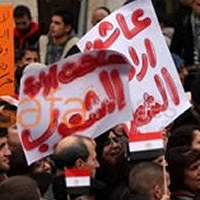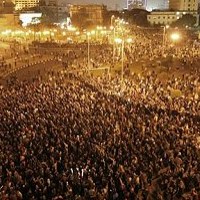![]()
Sun, Januari 23, 2011 | The Meir Amit Intelligence and Terrorism Information Center

“Zine el-Abidine Ben Ali (L) – Seyyed Ali Khamenei (R)”, from the blog http://zoorabad.wordpress.com/2011/01/14/doc099, January 14)
Iranian Reactions to Tunisia’s “Jasmine Revolution”
President Ben Ali’s ouster: a warning sign for Arab regimes or for Iran? Iranian reactions to Tunisia coup
This week, Iran’s media extensively covered the dramatic happenings in Tunisia and President Zine el-Abidine Ben Ali’s escape from the country.
Top Iranian officials took a careful approach in light of the developments and chose not to take a clear, unequivocal stand on the president’s departure. Commenting on the developments in Tunisia, Foreign Ministry spokesman Ramin Mehmanparast said that Tunisia’s various groups and parties must help restore safety to the country. He noted that Iran was following the developments in Tunisia, stressing, however, that it was an internal affair for Tunisia to resolve. Mehmanparast expressed hope that safety would soon be restored, and that Tunisia would resume playing an efficient part in the Muslim world (Fars, January 15).
Unlike top regime officials, several conservative newspapers took a more aggressive stance towards the ousted president, going as far as to claim that the developments in Tunisia were a warning sign for other Arab regimes in the Middle East that cooperate with the West.
The conservative daily Jomhuri-ye Eslami claimed that the dire economic situation and the unprecedented increase in inflation in recent years were the main causes for the Tunisian people’s uprising against their government. One cannot ignore the fact, however, that many demonstrators also carried slogans for political liberty. According to the daily, the events in Tunisia reflect the political crisis plaguing almost all Arab countries in the region. Such countries as Egypt, Jordan, Sudan, Yemen, and Algeria face conditions similar to those that prevail in Tunisia, and many Arab rulers who have held power for decades without free elections are highly concerned about the situation. The developments in Tunisia will undoubtedly affect other Arab countries, and there is no question that the Middle East is on the verge of a change. Western countries do not know what to do about the developments in Tunisia. While the U.S. expressed protest against Tunisia’s violent suppression of the demonstrators, it is highly concerned about the developments that could jeopardize Western interests in the country. The West is concerned about the possibility that the next government will not be as pro-West as the ousted president. According to Jomhuri-ye Eslami, Ben Ali was also one of the major allies of the “Zionist regime” in the region, another reason for the concerns expressed by the U.S. and the Zionist circles about the developments in the country (Jomhuri-ye Eslami, January 16).
The daily Keyhan claimed that the popular uprising in Tunisia reflected the awakening of public opinion in the region, which believes that the events that took place there will spread to other Arab countries ruled by tyrannical, corrupted regimes that are not supported by the people. According to the daily, the past several decades show that the Islamic republic of Iran can be a good role model of government for the peoples of the Middle East. Combining Islam and republicanism, it is the only model that has proven itself able to withstand tyranny and imperialism, and to ensure the safety of the region (Keyhan, January 18).
The daily Mardom Salari also discussed the effects of the developments in Tunisia on other Arab countries. An editorial published by the daily says that the revolutionary wave that first broke out in the Islamic revolution in Iran and now swept Tunisia would not remain confined to that country alone. The demonstrations that took place in Egypt and Yemen after the Tunisian coup indicate a growing desire for democracy among the region’s countries. The daily says it is a natural process, particularly when considering the fact that in Arab countries there are rulers who rule for over two decades, ignoring the rights of their opponents. They will therefore fare no better than the ousted president of Tunisia.
Ignoring the principles of democracy will sooner or later spell the end of their reign. In Saudi Arabia, where reformists demand that the king lift the political restrictions, as well as in other countries (such as Kuwait and the UAE), where social activists expand their activity to the political scene, developments indicate that democracy is the only way to progress and to develop the region’s countries, offering Muslim states a way out of the political dead end they have found themselves in. The developments in Tunisia may encourage other Arab rulers in the region to establish democracies in their countries. In that case, democracy will no longer be limited to the West, and Arab countries will also respect the wishes of the people (Mardom Salari, January 16).
On the other hand, sources affiliated with the reformist opposition understandably preferred to focus on comparing the Tunisian protest movement that led to the overthrow of the Tunisian president and the protest movement in Iran.
The parallels between the developments in Tunisia and the internal situation in Iran were most widely discussed in comments made by Iranian bloggers online. Some of them expressed hope that someday the Iranian people will also manage to bring about a political change, while to others the failure of Iran’s protest movement last year appeared all the more frustrating after the success of the popular protest movement in Tunisia to bring about a political change.
In response to the developments in Tunisia, an Iranian blogger wrote that, just like the Tunisian tyrant, Khamenei, too, will ultimately hear the voice of the people, and that it was better late than never. By the time tyrants hear and understand the voice of the people, it is always too late. When they do, they tend to make mistakes and aggravate the disaster. The blogger expressed hope that the events in Tunisia would be a lesson for tyrants in other countries who are not willing to give up power and believe that, as long as they are alive, they can control the life, money, and dignity of their countrymen (http://rightdeffender.blogspot.com/2011/01/blog-post_14.html, January 14).
Another blogger wrote that after the Tunisian people forced their president to flee the country, it was now the Iranians’ turn. The Iranian people, the blogger wrote, have an even more rational reason to choose such a course of action, because unlike the president of Tunisia, the president of Iran was elected in a forged election and brought the Iranian people to the most difficult economic conditions in the history of Iran (http://greenilam1.blogspot.com/2011/01/blog-post.html, January 14).
As already mentioned, for some bloggers the success of the Tunisia coup only served to highlight the failure of the protest movement in Iran. One blogger wrote that the Tunisian people had fought for two weeks, while the Iranian people had been fighting for a year and a half and had heard nothing except for the statements made by the reformist opposition leaders (http://visionisthetruth.blogspot.com/2011/01/2-15_14.html, January 14). Another blogger wondered why Tunisia succeeded where Iran had failed. The unemployment rate in Tunisia is 13.3 percent compared to nearly 20 percent in Iran, Tunisia’s economic growth in 2010 was 3.7 percent compared to less than one percent in Iran. The sensible question, therefore, is why Tunisia could do it while Iran could not (http://newperson1.blogspot.com/2011/01/blog-post.html, January 14).
In response to the comparison made by reformist elements between the protest movements in Tunisia and Iran, the daily Keyhan claimed that Iran’s “anti-revolutionary” opposition should be compared to the deposed president of Tunisia who, similarly to the Iranian opposition, served Western imperialists and fled to Saudi Arabia, a reactionary regime supported by the U.S., which also supported the opposition during last year’s riots in Iran. Unlike the Tunisian people who turned on their president, Keyhan argued, the Iranian people expressed their support of the government and their negative view of the opposition, affiliated with the U.S. and the West (Keyhan, January 16).



 RSS
RSS










#Iranian Reactions to #Tunisia's #Jasmine #Revolution | #Iran http://j.mp/eRg7Br
RT @CrethiPlethi: #Iranian Reactions to #Tunisia's #Jasmine #Revolution | #Iran http://j.mp/eRg7Br